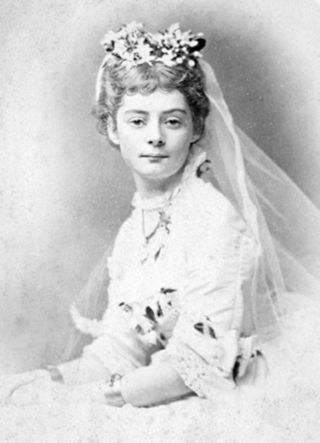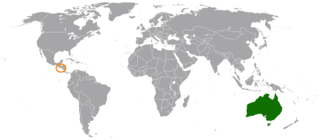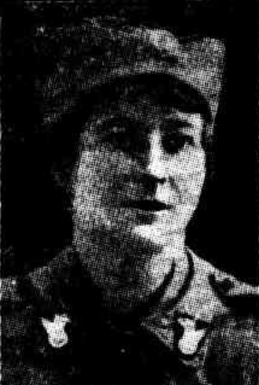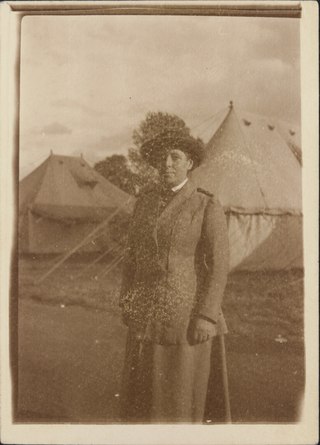
Joice NanKivell Loch MBE (24 January 1887 –8 October 1982) [1] was an Australian author, journalist and humanitarian worker who worked with refugees in Poland, Greece and Romania after World War I and World War II. [2]

Joice NanKivell Loch MBE (24 January 1887 –8 October 1982) [1] was an Australian author, journalist and humanitarian worker who worked with refugees in Poland, Greece and Romania after World War I and World War II. [2]
Joice Mary NanKivell was born at Farnham sugar cane plantation in Ingham in far north Queensland in 1887. Her father acted as manager of the plantation for Fanning, NanKivell, a company run by the Fanning brothers and her wealthy grandfather, Thomas NanKivell. The family fortune was lost however when Kanaka labour was abolished and Joice and her parents walked off the property virtually penniless. Her father, George NanKivell, took a job as manager on a run-down property in Myrrhee, North East Victoria where Joice grew up. She had wanted to become a doctor but the family was unable to pay university fees and so she helped on the property until she was 26 years old. After the death of her brother during World War I, her father abandoned the farm and Joice went to Melbourne where she worked for the Professor of Classics at the University of Melbourne and reviewed books for the Melbourne Herald . [ citation needed ]
She met her husband, Gallipoli veteran Sydney Loch when she reviewed his fictionalised autobiography The Straits Impregnable , which told of the horrors of that campaign. The book had been banned by the military censor fearful that if the truth about the slaughter at Gallipoli were revealed young men would stop enlisting to fight in France. [3]
Joice and Sydney Loch went to Poland as aid workers for the Quaker Relief Movement with the aim of writing a book about the damage that Lenin's troops had inflicted on Poland and were awarded medals by the President of Poland for their humanitarian work. [4] In 1922 they went to Greece as aid workers following the burning of Smyrna. The Lochs worked in a Quaker-run refugee camp on the outskirts of Thessaloniki for two years before being given a peppercorn rent on a Byzantine tower by the sea in the refugee village of Ouranoupoli, the last settlement before Mount Athos. [5]
To help the villagers, Loch purchased looms so that the women could work as rug weavers; she designed Byzantine rugs, one of which is now on display in the Powerhouse Museum in Sydney. She also acted as a medical orderly and held regular clinics for the villagers. For their work in Greece the couple were awarded medals by the King of the Hellenes. [2] [6]
During World War II, Loch was awarded another two medals by the Governments of Romania and Poland for saving a thousand Polish and Jewish children from the Nazis by leading a daring escape known as Operation Pied Piper from Romania where they were running a refugee centre for Poles who had escaped from the Nazis and the Russian invasion. Subsequently, the Lochs ran a refugee camp for Poles at Haifa. In 1953 they returned to Greece and their tower home and re-established the Pyrgos rug industry in Ouranoupolis. [7]
Sydney Loch (1888 – 6 February 1955) [8] was a Gallipoli veteran and a humanitarian worker. He was born in London, raised in Scotland, and sailed to Australia in 1905, aged 17, working first as a jackaroo. He joined the Australian forces at the outbreak of the First World War and served in Gallipoli until being discharged for wounds and illness. [4] He later became a journalist and writer. He and Joice NanKivell wed in 1919. They sailed for England and secured a contract to write a book on Ireland, which was published as Ireland in Travail. [8]
In addition to the honours bestowed on her by Greece, Romania and Poland, she was also honoured by Serbia and her home country Australia, In 1972 on the recommendation of the Australian government she was appointed a Member of the Order of the British Empire for "international relations". [9]
Sydney Loch died on 6 February 1955. Joice Loch died in her home in Ouranoupoli on 8 October 1982, aged 95.

Marian Ellis Rowan, known as Ellis Rowan, was a well-known Australian artist and botanical illustrator. She also did a series of illustrations on birds, butterflies and insects.
The American Farm School is an independent, nonprofit educational institution located in Thessaloniki, Greece. The school was founded in 1904 by American missionary John Henry House to serve the rural population of Greece and the Balkans. The current major educational divisions include the Secondary School, Perrotis College, the Primary School Program, the department of Adult Education & Research and the Greek Summer program. The school's mission is "to educate men and women, especially those from Greece and the Balkans, to become professionally accomplished in the latest aspects of agriculture and the life sciences."

Ouranoupoli is an ancient city and a modern village in Chalcidice. It is part of the municipality Aristotelis.
Nankivell and Nancekivell are surnames. Notable people with these surname include:

Salvadoran Australians are Australians of Salvadoran descent. Salvadoran immigration to Australia was caused principally by economic and political turmoil in El Salvador.
Loch is the surname of a Scottish Lowlands family whose members have included:
Moira Therese Kelly is an Australian humanitarian worker. In 2001, she was awarded the Order of Australia in recognition of her humanitarian service to both the Australian and international communities. In 2012, Kelly received the Victorian of the Year award and in 2003 and 2004, she was nominated for the Australian of the Year awards.

Ethel Carrick, later Ethel Carrick Fox was an English Impressionist and Post-Impressionist painter. Much of her career was spent in France and in Australia, where she was associated with the movement known as the Heidelberg School.

Olive May Kelso King was an Australian adventurer and mountain climber. During World War I she drove ambulances for the Scottish Women's Hospitals and later the Serbian Army. In the final stages of the war she raised money and set up mobile canteens to help feed the Serbian people. In all, she was awarded four medals by the Serbian government for her work during the war. After World War I, King held a senior volunteer position with Girl Guides Australia. During World War II, she worked as an examiner at the Havilland Aircraft factory.

Ethel Louise Spowers was an Australian artist associated with the Grosvenor School of Modern Art in London. She was especially known for her linocuts, which are included in the collections of major Australian and British Art Galleries. She was also a founder of the Contemporary Art Society, promoting modern art in Australia.
Joice is both a given name and a surname. Notable people with the name include:

Susanna de Vries AM is an Australian historian, writer, and former academic. She has published more than twenty books, making her one of Queensland's most published authors. The majority of these detail the bravery and hardships experienced by Australian women during the war with female contributions to the arts and various pioneering women the other main subjects of her work. She has also published books on art history and art crime. De Vries was trained as an art historian. In 1996, she was made a Member of the Order of Australia for services to art and literature. She was born in England then moved to Australia in 1975.

Harvey Broadbent, AM is an Australian writer, lecturer, broadcaster, former award-winning full-time television and radio documentary maker and cruise ship cultural history lecturer. He was appointed a Member of the Order of Australia on 26 January 2016 for significant service to the literary arts as an author and publisher, to the television industry as a producer, and to tertiary education. He is nowadays best known in Australia as a Gallipoli Campaign historian and specialist in Turkish, Anatolian, and Eastern Mediterranean history and culture.
The Straits Impregnable is a fictionalised autobiography written and published during the First World War. The author Sydney Loch had served in the First A.I.F. in the Gallipoli Campaign and the original manuscript was written as an autobiography of this service. By the time the manuscript was complete, Sydney had been returned wounded and sick to Australia and was still in active service. With wartime censorship in effect in Australia, his publisher Henry Champion advised that it should be edited and published as a novel to pass the censor. This was done and the first edition of 2,000 copies was well received and sold out quickly. Many names were changed with some very thinly disguised pseudonyms such as Capt. Carrot in place of Capt. Charles Bean. Sydney also used a pen name, Sydney De Loghe. The truthful and graphic portrayal of conditions at Gallipoli and their effects on the servicemen there made the book notable.
This article presents a list of the historical events and publications of Australian literature during 1982.
Florence Elizabeth James-Wallace (1886–1970) was an Australian nurse, who served with the Australian Army Nursing Service during World War I. She and her unit were praised for their service in support of the Australian soldiers.

Alice Elizabeth Barrett Kitchin was an Australian nurse who served in the First World War with the Australian Army Nursing Service.
Marcella Augusta Hempel, was a textile artist, second generation Bauhaus master weaver and lecturer in textiles. She was one of many émigré artists who came to Australia after the second world war, bringing training and expertise from Europe. She became a respected leader in the Australian Crafts Movement. Hempel designed and wove products such as rugs and scarves which were commissioned or exhibited by Australian companies, private collectors and craft and art galleries. Her work received a gold medal award from the Australian Wool Board. She lectured in Dresden then at the University of Applied Arts in Berlin, taught textile design at East Sydney Technical College, was the inaugural lecturer in textiles at the Riverina-Murray Institute of Higher Education and was conferred with a Honoris Causa award of Bachelor of Arts after retirement. Her woven travel rugs are held in national art collections.
Hieromonk Nikon of Karoulia was a Russian military officer and Orthodox monk. During his later years, he was known as a hesychast hermit and starets in Karoulia, Mount Athos.
The Friends Relief Service (FRS) was a voluntary humanitarian relief organisation formally established by a committee of Britain Yearly Meeting in November 1940. Largely staffed by pacifists and conscientious objectors, its aim was to provide humanitarian relief and social welfare to civilians affected by World War II. Key areas of operation included British cities affected by The Blitz, and refugee camps throughout north-west Europe, the Balkans and the Middle-East. One of its teams was also amongst the first humanitarian groups to reach Bergen-Belsen concentration camp. The organisation had three changes of name: Friends War Victims Relief Committee (November 1940 - February 1942); Friends War Relief Service (February 1942 - September 1943) and the Friends Relief Service (September 1943 - May 1948). The FRS was closed down on May 29, 1948.
{{cite book}}: CS1 maint: location missing publisher (link)